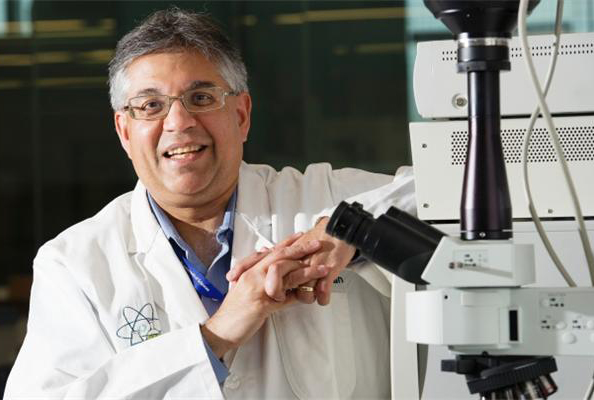
USask part of $2 million investment in new prostate cancer research
A team involving two University of Saskatchewan (Usask) researchers – Kishor Wasan, from the College of Pharmacy and Nutrition and Franco Vizeacoumar from the Saskatchewan Cancer Agency – is one of 10 teams across the country awarded a total of $2 million by Prostate Cancer Canada and Movember to accelerate discoveries that could save and improve men’s lives.
The team, led by University of British Columbia researcher Michael Cox, will receive a total of $200,000 to investigate a new way to stop prostate cancer cells from growing, using new knowledge that blocking cholesterol will cut off one of the cancer’s fuel sources.
“Often hormone therapy will only work for a while and then men run out of options. We need to find another option to give these men more time with their families and live a better life,” said Wasan.
It’s known that prostate cancer feeds off male hormones such as testosterone, so when the cancer spreads beyond the prostate, men are typically treated with hormone therapy to cut off the testosterone supply and slow tumour growth. But what has puzzled scientists is why, in some cases, the cancer continues to grow even when its testosterone supply has been cut off.
The answer appears to be that cancer cells actually convert cholesterol into testosterone to keep the cancer growing and spreading. Cox and Wasan are investigating widely-available cholesterol-lowering drugs called statins as a way to cut off cholesterol’s pathways into the prostate cancer cells. No cholesterol means no testosterone, which means cancer cells starve and stop growing.
In a discovery published in the July, 2019 issue of the prestigious journal Cancer Research, Cox and Wasan found that CRPC cells contain a molecule called SR-BI which captures cholesterol from the body and delivers it to cancer cells, where it is transformed into testosterone to fuel cancer growth.
In addition, published research has shown that men who use statins while being treated with second-generation hormone therapy for prostate cancer are living longer.
“Often hormone therapy will only work for a while and then men run out of options. We need to find another option to give these men more time with their families and live a better life,” said Wasan.
Their goal is to create a therapy that would block both the creation of testosterone from cholesterol and the attraction of cholesterol to prostate cancer cells. By the end of their two-year grant, they hope to have a better idea of which treatment combinations (hormones and statins) to give men to help them live longer. Large-scale human studies would then follow.
Read more about the 10 prostate cancer research projects at: www.prostatecancer.ca
-30-
For more information, contact:
Jennifer Thoma
USask Media Relations Specialist
306-966-1851
jennifer.thoma@usask.ca
